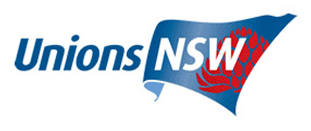Labor Council of New South Wales
 | |
| Full name | Labor Council of New South Wales |
|---|---|
| Founded | 1871 |
| Members | 800,000 |
| Affiliation | ACTU |
| Key people | Mark Lennon, Secretary |
| Office location | Sydney, New South Wales |
| Country | Australia |
| Website | www.unionsnsw.org.au |
The Labor Council of New South Wales is the peak representative body for trade unions in the state of New South Wales, Australia. As of 2005 there are 67 unions and 8 Rural and Regional Trades & Labor Councils affiliated to the Labor Council, representing 800,000 workers in NSW. It is registered as the State Peak Council of Employees under Section 215 of the Industrial Relations Act 1996 (NSW). The Council is affiliated with the Australian Council of Trade Unions (ACTU).
History
The Labor Council was formed by six unions in 1871, and originally called the Trades & Labor Council of Sydney. The council experienced rapid growth during its early history, with the number of affiliated unions tripling between 1885 and 1890, and total membership reaching 35,000 in that year, or 60% of union members in the Colony of New South Wales.[1] By 1891, 21.5% of all employees in the colony were union members, making it the most organised workforce in the world.[1] Union organisation in the colony suffered badly during the economic depression of the 1890s, due to high unemployment, aggressive anti-union policies of employers and a number of large, unsuccessful strikes including the 1890 Australian maritime dispute and the 1891 Australian shearers strike.[1]
In 1894, the Trades & Labor Council of Sydney changed its name to the Sydney District of Australasian Labour Federation. In 1900, it again changed its name to the Sydney Labor Council, changing again eight years later to the Labor Council of New South Wales. In 2005, it adopted the brand name UnionsNSW for all public purposes, but retained the official name Labor Council of New South Wales.
Responsibilities
The Labor Council of New South Wales is responsible for:
- implementing Australian Council of Trade Unions policy within New South Wales
- co-ordinating union activities and campaigns, involving more than one union
- providing assistance with research, negotiations and advocacy to affiliated organisations
- lobbying State Parliament for social and industrial reforms
- providing a public point of contact for general enquiries on New South Wales unions
- management of the Sydney Trades Hall, which was transferred in 2002 to the Labor Council from the original trustees, the Trades Hall Association.
Labor Council Secretaries
| No | Name | Year | Union |
|---|---|---|---|
| 1 | W. M. Ford | 1871 | |
| 2 | Thomas White | 1872 | Seamen's Union of Australia |
| 3 | Angus Cameron | 1873 | Progressive Society of Carpenters and Joiners |
| 4 | Thomas White | 1873 | Seamen's Union of Australia |
| 5 | Frank B. Dixon | 1873 | Operative Stonemasons' Society |
| 6 | Angus Cameron | 1874 | Progressive Society of Carpenters and Joiners |
| 7 | Edward I. Aiken | 1874 | |
| 8 | T. H. Hall | 1876 | |
| 9 | W. Helstey | 1880 | |
| 10 | William R. Roylance | 1880 | Operative Stonemasons' Society |
| 11 | J. E. West | 1883 | Operative Plumbers' Society |
| 12 | Frank B. Dixon | 1883 | Operative Stonemasons' Society |
| 13 | Thomas Symons | 1884 | |
| 14 | James J. Cronin | 1887 | New South Wales Saddle, Harness and Collar Makers' Protective Society |
| 15 | Thomas J. Houghton | 1888 | New South Wales Typographical Association |
| 16 | John Riddell | 1894 | Operative Stonemasons' Society |
| 17 | J. P. Cochran | 1894 | United Labourers Union |
| 18 | T. H. Thrower | 1903 | United Furniture Trade Society |
| 19 | J. P. Cochran | 1904 | United Labourers' Union |
| 20 | E. J. Kavanagh | 1910 | Pressers Union of New South Wales |
| 21 | J. S. (Jock) Garden | 1918 | Operative Sailmakers' Society |
| 22 | J. Howie | 1922 | Federated Coopers of Australia |
| 23 | J. S. (Jock) Garden | 1923 | Operative Sailmakers' Society |
| 24 | Robert Arthur King | 1934 | Australian Saddlery Trades Employees' Federation |
| 25 | James Kenny | 1958 | Australian Glass Workers' Union |
| 26 | Ralph Marsh | 1967 | Boilermakers' Society of Australia |
| 27 | John Ducker | 1975 | Federated Ironworkers' Association |
| 28 | Barrie Unsworth | 1979 | Electrical Trades Union |
| 29 | John MacBean | 1984 | Electrical Trades Union |
| 30 | Michael Easson | 1989 | |
| 31 | Peter Sams | 1994 | Australian Workers' Union |
| 32 | Michael Costa | 1998 | Australian Federated Union of Locomotive Enginemen |
| 33 | John Robertson | 2001 | Electrical Trades Union |
| 34 | Mark Lennon | 2008 |
See also
References
- 1 2 3 Cooper, Rae (Nov 2002). "'To organize wherever the necessity exists': the activities of the Organising Committee of the Labor Council of NSW, 1900-1910". Labour History. Australian Society for the Study of Labour History (83): 43–64. Retrieved 8 December 2013.